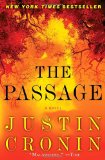Summary | Excerpt | Reviews | Beyond the Book | Readalikes | Genres & Themes | Author Bio

Excerpt
The Passage
Wolgast had been to the Compound only once, the previous summer, to meet with Colonel Sykes. Not a job interview, exactly; it had been made clear to Wolgast that the assignment was his if he wanted it. A pair of soldiers drove him in a van with blacked out windows, but Wolgast could tell they were taking him west from Denver, into the mountains. The drive took six hours, and by the time they pulled into the Compound, he’d actually managed to fall asleep. He stepped from the van into the bright sunshine of a summer afternoon. He stretched and looked around. From the topography, he’d have guessed he was somewhere around Telluride. It could have been further north. The air felt thin and clean in his lungs; he felt the dull throb of a high-altitude headache at the top of his skull.
He was met in the parking lot by a civilian, a compact man dressed in jeans and a khaki shirt rolled at the sleeves, a pair of old-fashioned aviators perched on his wide, faintly bulbous nose. This was Richards.
“Hope the ride wasn’t too bad,” Richards said as they shook hands. Up close Wolgast saw that Richards’ cheeks were pockmarked with old acne scars. “We’re pretty high up here. If you’re not used to it, you’ll want to take it easy.”
Richards escorted Wolgast across the parking area to a building he called the Chalet, which was exactly what it sounded like: a large Tudor structure, three stories tall, with the exposed timbers of an old-fashioned sportsman’s lodge. The mountains had once been full of these places, Wolgast knew, hulking relics from an era before time-share condos and modern resorts. The building faced an open lawn, and beyond, at a hundred yards or so, a cluster of more workaday structures: cinderblock barracks, a half-dozen military inflatables, a low-slung building that resembled a roadside motel. Military vehicles, Humvees and smaller jeeps and five ton trucks, were moving up and down the drive; in the center of the lawn, a group of men with broad chests and trim haircuts, naked to the waist, were sunning themselves on lawn chairs.
Stepping into the Chalet, Wolgast had the disorienting sensation of peeking behind a movie set; the place had been gutted to the studs, its original architecture replaced by the neutral textures of a modern office building: gray carpeting, institutional lighting, acoustic tile drop ceilings. He might have been in a dentist’s office, or the high-rise off the freeway where he met his accountant once a year to do his taxes. They stopped at the front desk, where Richards asked him to turn over his handheld and his weapon, which he passed to the guard, a kid in cammos, who tagged them. There was an elevator, but Richards walked past it and led Wolgast down a narrow hallway to a heavy metal door that opened on a flight of stairs. They ascended to the second floor, and made their way down another non-descript hallway to Sykes’ office.
Sykes rose from behind his desk as they entered: a tall, well-built man in uniform, his chest spangled with the various bars and little bits of color that Wolgast had never understood. His office was neat as a pin, its arrangement of objects, right down to the framed photos on his desk, giving the impression of having been placed for maximum efficiency. Resting in the center of the desk was a single manila folder, fat with folded paper. Wolgast knew it was almost certainly his personnel file, or some version of it.
They shook hands and Sykes offered him coffee, which Wolgast accepted. He wasn’t drowsy but the caffeine, he knew, would help the headache.
“Sorry about the bullshit with the van,” Sykes said, and waved him to a chair. “That’s just how we do things.”
Excerpted from The Passage by Justin Cronin Copyright © 2010 by Justin Cronin. Excerpted by permission of Ballantine Books, a division of Random House, Inc. All rights reserved. No part of this excerpt may be reproduced or reprinted without permission in writing from the publisher.
Your guide toexceptional books
BookBrowse seeks out and recommends the best in contemporary fiction and nonfiction—books that not only engage and entertain but also deepen our understanding of ourselves and the world around us.